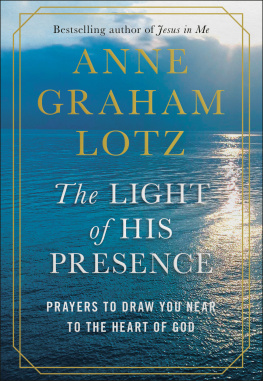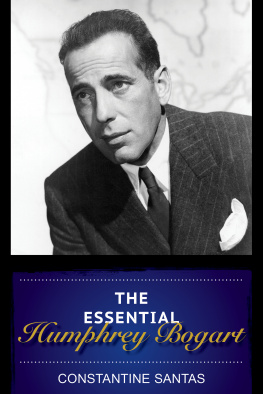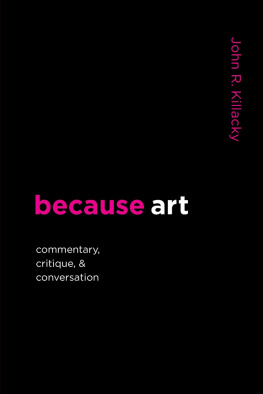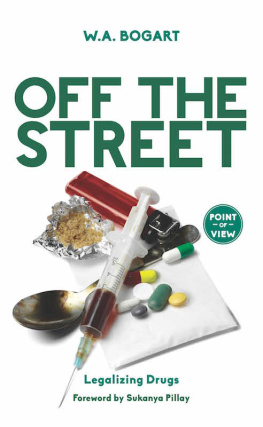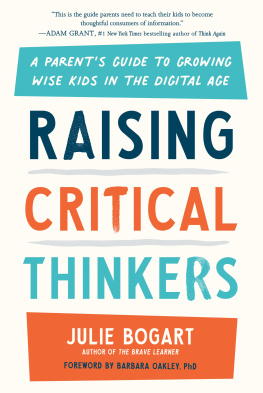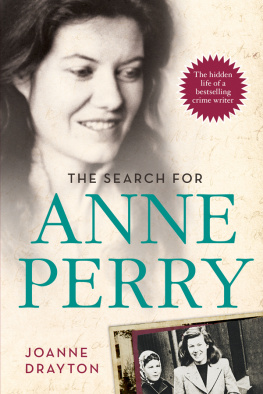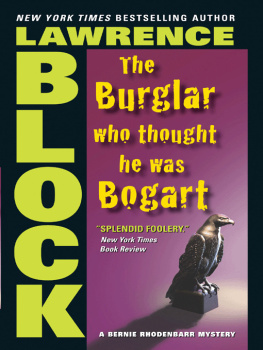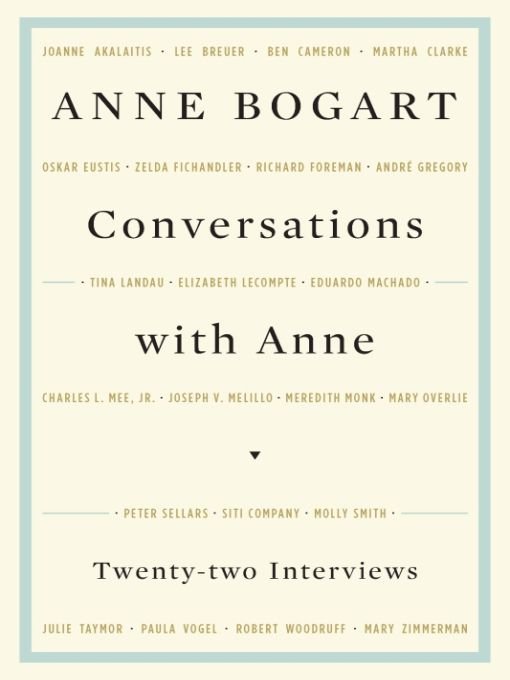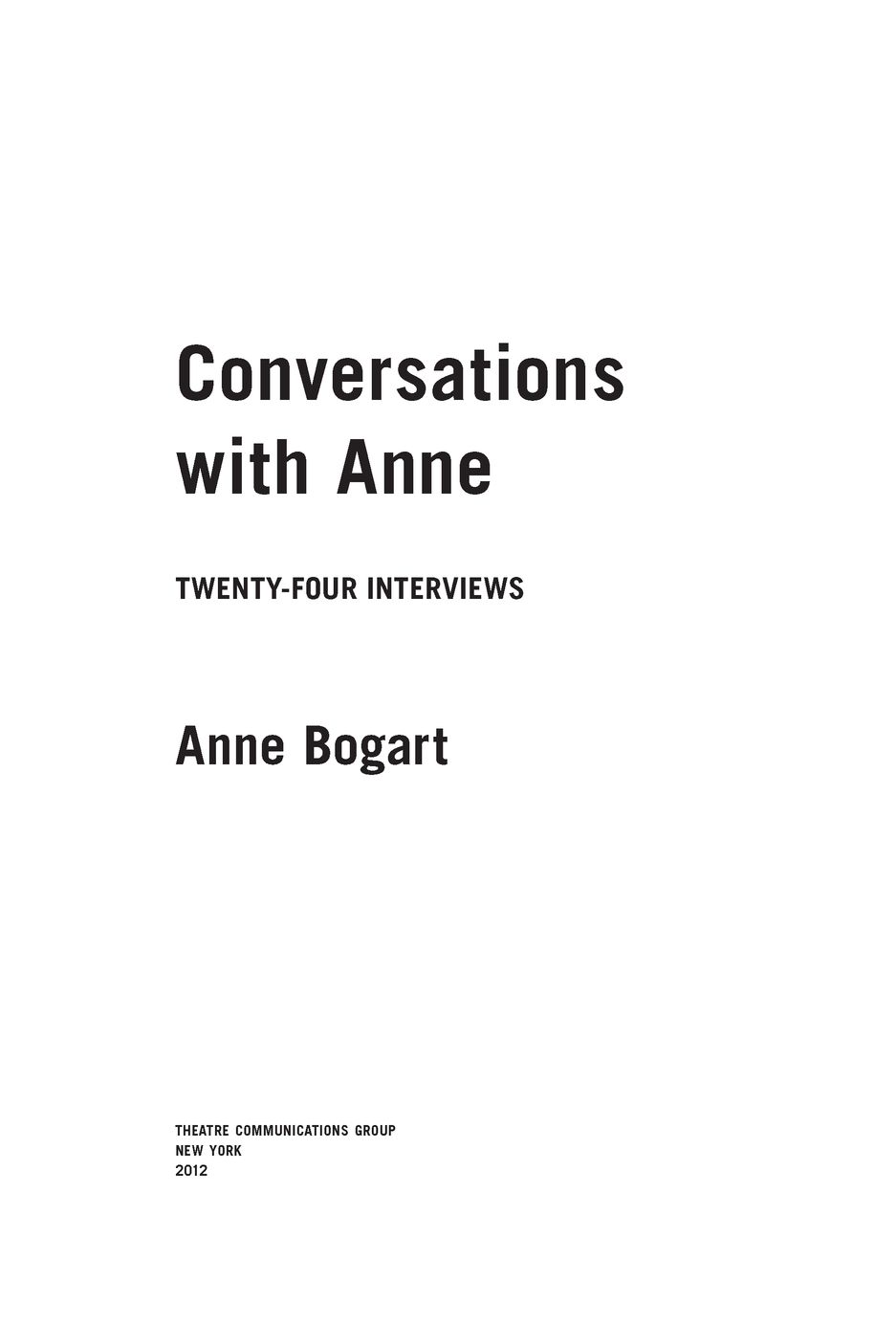Table of Contents
Other Books By Anne Bogart Available From TCG
The Viewpoints Book:
A Practical Guide to Viewpoints and Composition
by Anne Bogart and Tina Landau
Conversations with Anne has been in the making since early 2003 and it is impossible to adequately thank the numerous individuals who made the book possible. Many thanks go to the artists who so generously shared their personal stories and artistic journeys. Heartfelt thanks also go to the countless people who helped organize and manage the twenty-four interviews for Conversations with Anne, including the SITI Company administration led by Megan Wanlass, the ongoing help of the SITI Company interns, the many artist assistants and staff who helped with getting approvals, edits and proofreading, the practical support of SITI Company board members and the TCG publications staff for their dedicated work over the years with the realization of this book. Thanks also to the staff at the University of Chicago who arranged the conversation with Mary Zimmerman, and the American Repertory Theater who hosted the conversation with Robert Woodruff.
Introduction
By Anne Bogart
After 9/11, I noticed that people were gravitating with gusto toward one another to converse, to consider, to listen and to discuss substantive issues. People gathered in town halls, church basements and empty theaters. There seemed to be a need for mutual exchange under standard light, without artifice or the separation of stage and audience. The communities that formed shared an appetite for thinking together, musing together and considering the future in relation to the past, to the present and to recent events.
In this spirit I began an initiative in SITI Companys studio entitled Conversations with Anne. I invited colleagues who I admire and respect, one by one, to engage in a public conversation with me. Because the response was universally positive, we continued organizing these conversations throughout the past decade. At times Conversations with Anne happened in other cities, including Chicago, Boston and Baltimore. The transcripts of these conversations appear here and I am happy to share them with a larger community who might benefit from the reflections of these singular individuals captured in a moment in time in the midst of their distinct journeys.
Richard Foreman
As an undergraduate at Bard College I was part of a posse of theater students who organized the I Hate Richard Foreman Club. We were zealous in our dislike for the man and his work. It was the early nineteen seventies and we often made journeys to New York City to see the work of the Open Theater, the Living Theatre, The Manhattan Project, the Performance Group, Peter Brooks Thtre des Bouffes du Nord and Richard Foremans Ontological-Hysteric Theater. We relished our hate for Foremans work.
When Bards film department invited Richard to speak with film students, we rounded up the I Hate Richard Foreman Club to face him down. Much to our surprise, no film students showed up, which left us to face and accuse him directly: You use actors like props! At the time, we were all highly influenced by Jerzy Grotowskis brand of actor-centric poor theater, and Richards auteur theater seemed heretical to us. Much to our frustration, Richard not only agreed that he treated actors as props, but then he abandoned us to watch a video of his production Sophia Equals Wisdom. We seethed.
In 1974, freshly out of college, I moved into a cheap loft on Grand Street in New York City, only a block away from Richards theater on Broadway near Spring Street. Each and every evening that I had nothing else planned, I made my way to Richards theater to watch a rehearsal or performance. Inevitably I left at the end of the evening hating the man and his work even more. But then I would return. I returned again and again. After about a year, I realized that not only did I not hate Richard Foreman, but also that he had taught me more than any other director. I finally saw that his work is perhaps the closest descendent to Bertolt Brechts, and that Richard was developing Brechts ideas forward.
Richard grew up in Westchester County, near New York City, graduated from Brown University in 1959, and went on to receive an MFA in playwriting from Yale School of Drama. Unhappy with the general state of theater and playwriting, he began to direct his own plays in New York City, often working with nonprofessionals and filmmakers as actors. Since then, he has produced and directed almost sixty of his own plays with his company the Ontological-Hysteric Theater. He also received a great deal of acclaim for his productions of Brechts Threepenny Opera at Lincoln Center; Suzan-Lori Parkss Venus and plays by Vclav Havel and Botho Strauss at the Public Theater; Woyzeck at Hartford Stage Company; Molires Don Juan at the Guthrie Theater; Kathy Ackers Birth of the Poet at the Brooklyn Academy of Music; and Gertrude Steins Dr. Faustus Lights the Lights at the Autumn Festivals in Berlin and Paris. He collaborated as librettist and director with composer Stanley Silverman on eight music-theater pieces produced by The Music Theater Group and The New York City Opera. He also wrote and directed the feature film Strong Medicine. In opera he directed Die Fledermaus at the Paris Opera, Don Giovanni at the Opra de Lille, Philip Glasss Fall of the House of Usher at the American Repertory Theater and The Maggio Musicale in Florence.
Five of Richards own plays received Obie Awards for Best Play of the Year, and he received four other Obie Awards for directing and one for sustained achievement. He has also received the Literature Award from the American Academy and Institute of Arts and Letters, a Lifetime Achievement in the Theater Award from the National Endowment for the Arts, the PEN American Center Master American Dramatist Award, a MacArthur Fellowship and, in 2004, he was elected officer of the Order of Arts and Letters of France. He received an honorary doctorate from his alma mater, Brown University. New York University recently acquired his archives. Seven collections of his plays have already been published, and books studying his work have been published in New York, Paris, Berlin and Tokyo.
March 31, 2003
AB: Let me start by telling my personal story with Richard. When I was an undergraduate at Bard College in upstate New York, I was part of a company, Via Theater, which was very influenced by Grotowski. We used travel to New York in a van and we would see things that really rocked our worlds as twenty-one year olds. Peter Brook would do these workshops, and we would see the Open Theater and the Living Theatre and the Performance Groupand there was Richard Foreman. I hated Richard Foreman. I just thought he was awful. We formed the I Hate Richard Foreman Club. This was 1973. We saw a sign at school saying that Richard Foreman was coming to visit the film studentsbecause Richard used to work with film students as actors. So the I Hate Richard Forman Club all went to torture him, but none of the film students showed up. So, Richard came in, and we said, You treat actors like props! And Richard said, Yeah.
So, I moved to New York, to Grand Street and Crosby, where I had a loft in 1974 for three hundred and twenty-five dollars per month for three people. Richard had a theater which was just a room on Broadway. Every time I had a free night Id say, What do I want to do tonight? Well, Im going to go to Richard Foremans and watch what hes doing. Id go over and watch either a performance or an open rehearsal, and Id leave afterward going, I hate this, I hate that, I hate Richard Foreman. And then the next free night, What am I going to do? I think Ill go see Richard Foreman. And after a year I realized that, in fact, Id learned more from Richard than from anyone else and that Im actually more influenced by Richard than anyone else. Thats how I came up with the theory, which I hope is true, that Richard is actually the actor version of Bertolt Brecht.


